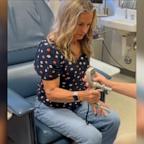Salmonella victim's mother calls for better investigations
— -- Gabrielle Meunier, a controller for a Vermont real estate company, has deployed technology to speed and improve her work. She wants governments to do the same to speed and improve food-borne illness investigations.
She has more than a passing interest in the subject.
Her son, Christopher, 7, suffered salmonella poisoning as part of the peanut-related outbreak tied in January to products made by the Peanut Corp. of America. Hospitalized for six days after Thanksgiving, the boy hurt so much, he wanted to die, his mother says. His medical care was superb. Then, the story turns infuriating, she says.
After the Vermont hospital discovered salmonella, 11 days passed before state health officials interviewed Meunier at length about what Christopher ate and where, she says.
Meunier, 48, who testified at a congressional hearing on the outbreak last month, says food history forms should be online so that potential victims can fill them out immediately — when memories are fresh — rather than have to wait to be called by a health worker.
She also says government agencies must get better at gathering and sharing information. At one point, Meunier was told by a health worker that she "didn't need to know" what kind of salmonella her son had, she says.
A low point in her quest to find out what sickened her son came after foodmaker Kellogg said in mid-January that its peanut butter crackers may have been made with peanut paste from PCA. Christopher had eaten some of those crackers at a sports camp right before he became ill, Meunier says.
Instead of being notified by any federal or state agency that the crackers were suspect, Meunier heard about it from a friend who had read about it. A computerized phone message from government agencies to warn people who'd reported illnesses should've gone out, she says.
Meunier then called the national Centers for Disease Control and Prevention to tell investigators that she might have some leftover crackers they could test. Her call went no farther than a receptionist, she says, because she didn't know who to ask for. The CDC's Assistant Surgeon General Ali Khan says he is "disturbed" by her inability to get through. Kellogg then recalled the crackers.




